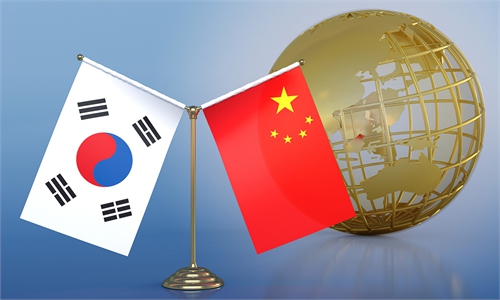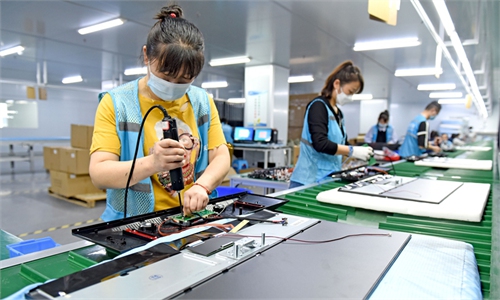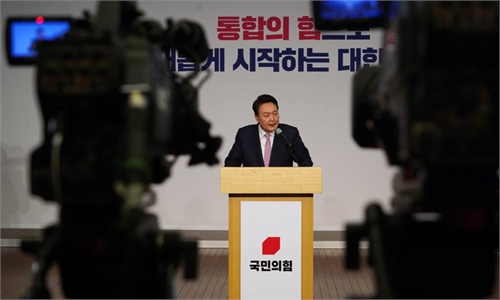Visiting Chinese VP meets Moon Jae-in, says ‘friendly cooperation should not change’
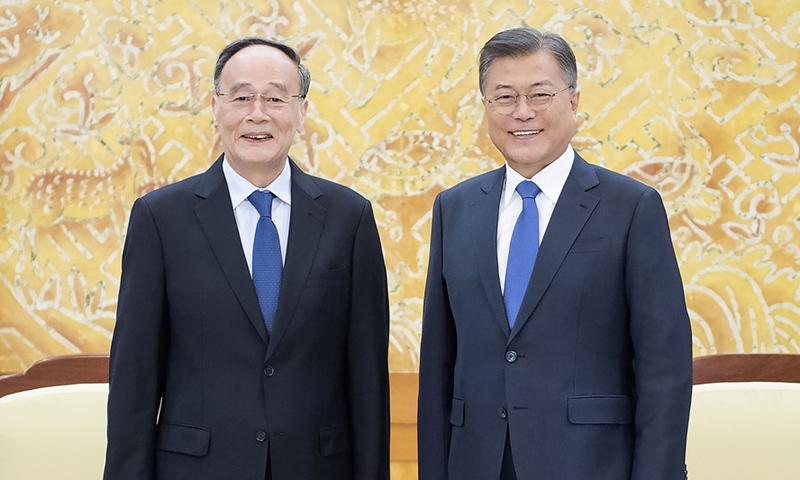
Chinese Vice President Wang Qishan (left) meets with outgoing South Korean President Moon Jae-in in Seoul on May 9, 2022. Photo: Xinhua
Chinese Vice President Wang Qishan met with outgoing South Korean President Moon Jae-in in Seoul on Monday, a day before attending President-elect Yoon Sul-yeol's inauguration as a special representative of Chinese President Xi Jinping.Wang delivered Xi's greetings to Moon and stressed progress in relations in the past five years under the instruction of the two top leaders, the Xinhua News Agency reported.
This year marks the 30th anniversary of diplomatic ties and the two countries have enjoyed close high-level exchanges, deepening cooperation and smooth coordination on multilateral communication, Wang said, stressing the resilience and great potential of bilateral trade and economic cooperation.
Wang said that no matter how international and regional situations change, the fundamentals of friendly cooperation between China and South Korea will not and should not change. That is a key lesson learned from the history of bilateral relations.
Moon said the meeting was the last key diplomatic activity in his tenure and asked Wang to deliver his greetings to Xi. Bilateral relations in the past five years overcame challenges and made progress, Moon said, expressing hope that the next South Korean government will continue the momentum.
Amid the power transition, Chinese observers spoke highly of the Moon administration's balanced foreign policy and efforts to bring China-South Korea relations, which deteriorated after South Korea's deployment of a THAAD system, back to a track of positive development.
Yoon may lean more toward the US than Moon did and China-South Korea ties may experience a period of adjustment, Chinese experts said, stressing benign China-South Korea relations will benefit China and South Korea, and the Yoon administration is expected to continue on the right path rather than bring about a major setback.
Lü Chao, an expert on the Korean Peninsula issue at the Liaoning Academy of Social Sciences, told the Global Times on Monday that Moon's balanced foreign policy has generated a positive influence on peace, stability and prosperity in the region.
Friendly ties with China, not taking sides in major countries ensured the independence of South Korea and stable economic growth, Lü said, citing the progress in China-South Korea trade and economic cooperation in the past years.
Experts also noted Moon's handling of the Korean Peninsula issue, including three summits with North Korean leader Kim Jong-un and efforts to facilitate negotiations between Kim and then US president Donald Trump.
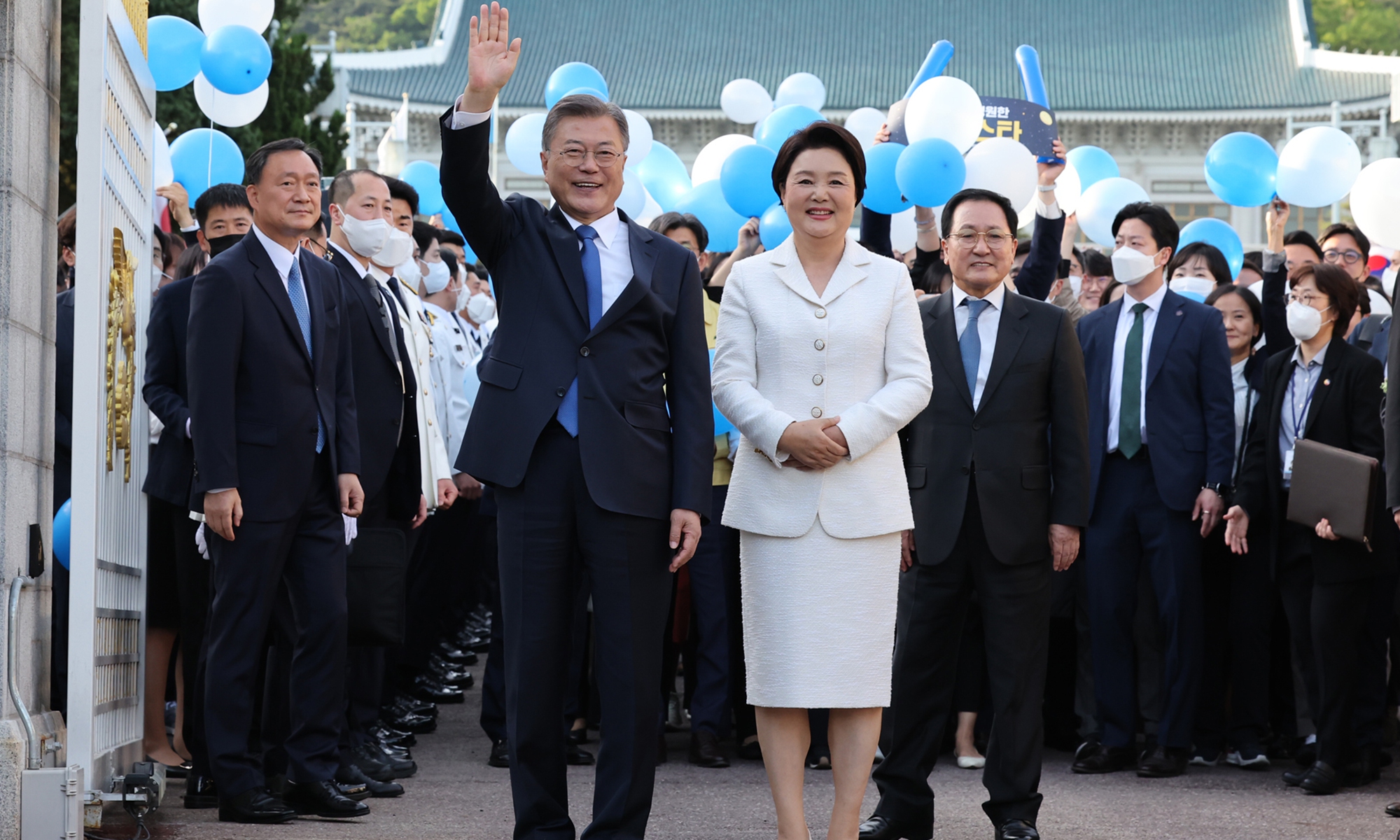
Outgoing South Korean President Moon Jae-in (left) and first lady Kim Jung-sook wave as they leave the presidential office in Seoul for the last time as the first couple on May 9, 2022. Photo: VCG
Over the sensitive THAAD issue which dragged China-South Korea ties to the abyss, Moon said "three no's" -- no participation in the US' missile defense network, no establishment of a trilateral military alliance with the US and Japan, and no additional THAAD deployment.
However, Yoon said that he did not consider the "three no's" achievable within the context of mutual respect, and his senior advisor said Yoon supports an additional THAAD deployment, which casts a shadow on China-South Korea relations.
"It remains to be seen how Yoon's policy will unfold," Lü said, predicting China and South Korea will enter a period of adjustment but relations won't see a dramatic step back.
So far, interactions between the two sides are positive and China has made clear its bottom line -- South Korea's relations with other countries should not be developed at the expense of China's interests, the expert said.
On Monday, Japanese Foreign Minister Yoshimasa Hayashi arrived in Seoul to attend the inauguration.
The US eyes an enhanced trilateral alliance with South Korea and Japan, particularly in military fields to target China. But the obstructions in South Korea-Japan relations remain rocky, Lü said. "The territorial disputes, historical problems and the animosity between the two peoples cannot be addressed soon."
However, experts warned of South Korea's participation in US-led geopolitical mechanisms. The South Korean state intelligence agency has joined a cyber defense group under NATO as the first Asian member amid the alliance's "Asianization."
Yang Danzhi, an expert at the Chinese Academy of Social Sciences, said Yoon's challenge lies in how to properly handle relations with China, US and Japan against the backdrop of rising tensions in Northeast Asia.
A balanced policy will benefit South Korea and the Yoon government is expected to show its diplomatic wisdom and strategic independence, Yang said.
